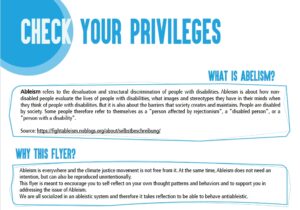Ability – Ableism and barriers
What is Abelism?
Ableism refers to the devaluation and structural discrimination of people with disabilities. Ableism is about how non-disabled people evaluate the lives of people with disabilities, what images and stereotypes they have in their minds when they think of people with disabilities. But it is also about the barriers that society creates and maintains. People are disabled by society. Some people therefore refer to themselves as a “person affected by rejectionism”, a “disabled person”, or a “person with a disability”. Source: https://fightableism.noblogs.org/about/selbstbeschreibung/
[More Information for inclusion and accessiblity at Ende Gelände]
A flyer about ableism – Why this flyer?
[Download Flyer DE – Download Flyer EN]
Ableism is everywhere and the climate justice movement is not free from it. At the same time, Ableism does not need an intention, but can also be reproduced unintentionally.
This flyer is meant to encourage you to self-reflect on your own thought patterns and behaviors and to support you in addressing the issue of Ableism.
We are all socialized in an ableistic system and therefore it takes reflection to be able to behave antiableistic.
From whom to whom?
This flyer was created by disabled and non-disabled people and is explicitly aimed at non-disabled people.
Tips & Wishes
- Check your privileges: Be aware that you have more privileges than other people because of your non-disabled body.
- When testimonials about Ableism are shared, listen. Don’t ask urgently if a person doesn’t like to share more. This can be retraumatizing.
- When ableist behavior is pointed out to you, don’t react with defensiveness, but accept the criticism and try to learn from the situation. Do not judge the tone in which the criticism is made. It often takes a lot of effort to express criticism, and often people concerned themselves have to point out ableistic behavior. Therefore, do not make effusive or justifying excuses.
- Do not change your tone when talking to people with disabilities. Also, don’t treat them like children or as if they are pitiful or need to be spared.
- Reflect on your language. Disabled is not a synonym for shit, but a neutral self-designation for people with disabilities. Therefore, use the word only in this context. Do not use euphemisms. People with disabilities are not special or have special needs. Do not use ableistic words or phrases, not even as an example.
- Adopt the chosen self-designation of the person concerned, if it is familiar to you.
- Don’t ask people with disabilities you don’t know or have just met why they have a disability. First, this is none of your business and second, it is a personal question that can be
retraumatizing. - There are also disabilities that are not visible – have this in mind.
- Refrain from heroizing. Phrases like “How brave that you are here” are hurtful and tend to make the person feel not like an equal part of the community.
- People with disabilities are not a source of inspiration according to the motto “If he*she can do it, so can I” – of course you can be inspired by people with disabilities but not in spite of or because of their disability!
- Do not patronize. Don’t use sentences like “I don’t think you can do that distance”. Give a realistic assessment of the route and let the person decide for themselves.
- Do not have positive pity. Even pitying looks are hurtful and suck. Life with a disability is worth living!
- Do not commit non-disabled saviorism. This means, that non-disabled people force their help on people with disabilities, want to help without being asked where no help is needed, or feel better because of the alleged help. If you feel that help might be needed, ask once and accept a no!
- During actions and at camp, there should be a space where people have the opportunity to express their needs. If you want to help, aim for such a place, for example.
- Be aware of barriers, such as the lack of accessible toilets. Talk to people to identify them and act to get them removed.
- Don’t talk for/about activists with disabilities, talk with them! For example, if you want to displace a person that is pushing a wheelchair, talk to the person in the wheelchair first and ask if it is okay for them.
Reading this flyer is the least you can do, but it is only a small step. We are all learning. Our mission is to raise awareness of ableist behaviors and inspire change! You recognize yourself in one or more points? Or do you think the flyer is too much because you already know everything about discrimination? This is (most likely) not the case!
We are all socialized ableist and make mistakes, admitting that to yourself can be uncomfortable. The important thing is to question your behavior, pay attention to what you say, and do better! There is more information here, among other places:
German Books:
- Behindert und Stolz: Warum meine Identität politisch ist und Ableismus uns alle etwas angeht; Luisa Laudace (2022)
- Wie kann ich was bewegen? Die Kraft des konstruktiven Aktivismus; Raul Krauthausen, Benjamin Schwarz (2021)
German & English Podcasts:
- im Aufzug, echt behindert, Rampe? Reicht!, die neue Norm, all inclusiv, from the throne, sit the f*CK down
[Download Flyer DE – Download Flyer EN]
[More Information for inclusion and accessiblity at Ende Gelände]
